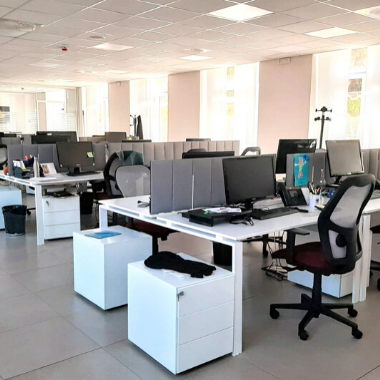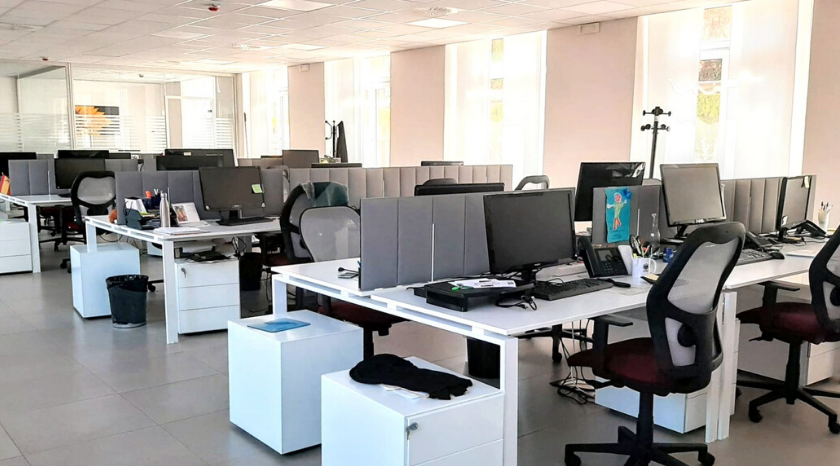
Being a CEO in the time of Covid-19

Being a CEO in the time of Covid-19
I have spent, like many of us, almost 3 months at home. I’m the CEO of Amilon, we sell gift cards to companies and we have a totally digital business … shouldn’t be a problem, but we are over 60 people and suddenly we found ourselves without an office. We have to get organized, will we handle it? Will our guys manage to work from home? Will I be able to do it? All day at home, without the morning coffee at the bar with Fabio, without the gatherings in the meeting rooms, without the moments of sharing, without the incursions in my office for any kind of request.
I’ve equipped myself: now I have a new colleague, my wife Anna, and in our home/office it’s not so bad after all… I’m lucky enough to have a balcony that has given me, even when you couldn’t go out, the chance to get some air every now and then, the coffee break with Anna outdoors, thanks to the excellent weather and the incredible and magical silence that enveloped Milan in March/April.
Still, like everyone else, I had to reorganize my life. And I understood many things, for example I realized that in three months we did what we would have done in 10 years, and I’m not too sure it will even have been enough. Covid-19 has given us an incredible leap forward, and at the very least, it has forced me to do it.
One can work from home even better than one can work from an office. The virus has opened a chasm in the beliefs I’d built up in almost 30 years of working. I started my professional career by punching the clock at 8.30 a.m. in that wonderful company known as Perfetti Van Melle, I went on to Beiersdorf where my boss often asked me if I was taking a vacation when I left the office before 7 p.m. I made these teachings my own, thinking that “that’s how you work” even if with the necessary flexibility. In the last 3 months I have changed my mind: for example, I always thought that to get something from a colleague, the way to do it was to physically “visit” him at his desk, offer him a coffee at the machine, ask him about his family, his passions and then talk about work and get to my goal. Today I think the same way, but the same thing can be done with a virtual visit.
Yesterday I called Alessandro on Teams, Ale is a precious colleague who has been working with us for many years. He showed me in video chat his garden and his vegetable patch, before talking about work. He was happy because he now avoids the 2 hours of heavy train travel every day and during those 2 hours he is less stressed and works more intensively. It can really be done.
I have appreciated the meetings on Teams, more concrete and often faster, the ease with which we exchange information and still make decisions: people interact almost more than at their desks, which all in all forces us to remain at our place for hours. Years ago I worked for Heineken, in an office building that expanded vertically and to go to see a colleague on the fifth floor, if you were on the first floor, you needed a good quarter of an hour, as just one elevator served the whole office. So nobody moved. A nightmare, everyone on the phone from their desk for 8-10 hours a day with colleagues who were 10 meters away, vertically. You never actually saw each other, however we still had to punch a time card and there was no Zoom.
Yes, of course, there are also those who hide behind Zoom and maybe instead of doing more, do a little less… but they would do the same in the office.
Not everything is perfect of course, for example, I miss the chatter, the discussions, I miss sensing through the walls the mood in the company, perceiving immediately if something is wrong. The “Company Mood” meter on Zoom and Teams is not there yet, but they will find a way to introduce it. I have discovered that in the most advanced video chat software there is a “subtitle” function that is fantastic for meetings in English, as I never understand the Irish… they have an impossible English. Long live technology, always!
Working from home is still a revolution and we have to adapt and get used to it quickly: many have felt the need for larger spaces, a quiet home working environment, a high-performance connection and modern and up-to-date work tools. This will bring important opportunities for real estate professionals, architects, hardware and software manufacturers.
Many have had to manage their young children at home from school, to care for, feed and entertain them. So, maybe the ones who were really dreaming of the office were these parents. If we go back to a normal world where children go to school in the morning, then they too would enjoy Smart Working. Otherwise, solutions are needed, in this context I’ve seen very few ideas nor politicians who understand the problem of helping especially mothers, who are the most penalized.
Now, having made these reflections, I don’t know what will happen in September. I don’t know if we will be back as before with 60 people occupying a wonderful new open space office of 900 square meters. Will we still need all that space? Will we have to renovate again to adapt to the new rules? Is it really necessary for a colleague who lives in Arona to take the train every morning? Or that Martina who is from Romagna is spending 70% of her salary to pay for a house in Milan, just to be able to have a job? We will understand it further on, but in my head many things have changed and frankly I think that removing in one hit all the flexibility for people who work would be impossible. I also think it is neither useful nor productive.
Have a good summer, everyone.
A letter from Andrea Verri, CEO of Amilon

Are gift cards for employees Tax-Free?
Potrebbe anche piacerti

Post-holiday blues: How to keep your team motivated
Agosto 30, 2014
Amicafarmacia: the new gift card for the “healthcare” category
Novembre 14, 2018

